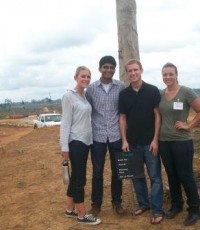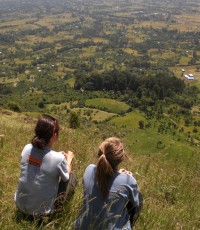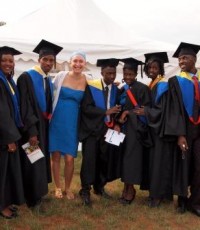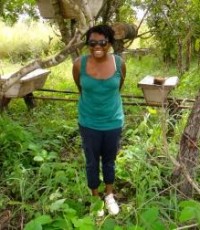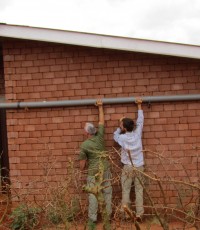January - February 2013
Enjoy this edition of the Fellows Flyer and learning about what some of our Fellows in Ethiopia, Gabon, Tanzania, Uganda, Rwanda and Kenya are up to. Our Fellows have been planning World AIDS Day events, demonstrating a company’s commitment to sustainable development, and struggling to keep their socks clean. I hope you’ll be as inspired as I am by their work.
Princeton in Africa welcomed 2013 with the help and involvement of many of our incredible Board Members and former Fellows. Together, we interviewed 140 of this year’s 466 applicants. The interview process is always an energizing and stimulating one, and we are thrilled to have so many qualified candidates to offer our partner organizations.
In just a few weeks, the PiAf staff will gather together in Uganda with 40 of our Fellows for the 2012-13 Fellows’ retreat. We look forward to sharing, learning, and reflecting on the successes and challenges of the Fellows’ experiences to date. Stephanie, Agatha, and I will also make site visits across the continent to see our Fellows in action, to strengthen our relationships with partners, and to meet with new potential partner organizations.
As we look ahead to the coming months, we anticipate announcing a few new partnerships, although we are also conscious of the need to grow in a responsible and deliberate manner to ensure that all of our fellowships maintain a high standard of quality and individual attention from PiAf.
We expect great things for PiAf in 2013 and will enjoy sharing more stories with you throughout the coming year!
Katie Henneman
Executive Director
PiAf Connections
Please click below to check out pictures of our Fellows, Alums and other members of the PiAf family meeting up at home and around Africa.
Notes from the Field
By Nabil Hashmi, 2012-2013 Fellow with Olam International in Gabon
When I broke the news to my friends and family that I was moving to Gabon to work for Olam International, most had the same reaction: “Where is Gabon?” I didn’t really blame them. Gabon covers an area about the size of Colorado with a population roughly equal to that of Idaho. It’s not a very large or populous place, especially for someone used to living in Washington, D.C. for most of the past five years.
The size of Olam underscores just how small Gabon can feel. There are hundreds of staff at the Libreville office where I work. With even more employees at project sites throughout the country, the Singapore-based company is already one of the largest in Gabon. Our cars and trucks, emblazoned with Olam insignia, are easily recognized throughout much of the country. Olam is involved in launching a Special Economic Zone and developing palm oil, rubber, timber, and fertilizer projects. These are all ventures that will comprise a significant portion of the country’s economy and they all require a long-term perspective and commitment. News about the company appears in newspapers daily, and even as an employee of the company, I struggle to stay abreast of every new development. Proving to the country that Olam is not a company that will cut and run—like some other enterprises have—is a continuous challenge.
I work with four other Fellows on Olam’s Corporate Responsibility and Sustainability team. I’ve had the privilege to work on a number of engaging and challenging projects, including launching a social impact index, designing a rural agricultural cooperative, and establishing a partnership with the Gabonese Red Cross. Despite having the chance to work on projects like these, the aspect of the position that has been simultaneously the most frustrating and the most rewarding was never part of my job description. Working for such a large firm in a relatively small place makes us especially visible. That visibility means that in most places, I feel like an Olam employee first, and a private citizen second. Conversations about work follow us everywhere. Being able to blend in without having to talk about where I work is a form of privacy I miss at times.
But for the most part, I enjoy helping form someone’s opinion towards Olam. Given the size and scope of Olam’s investments and how new the company is to Gabon, people justifiably pose many questions about our work in their country. Through my conversations outside of the office, I’m perhaps more able to show that Olam is committed to sustainable development than I sometimes feel able to when I’m working at my desk. I’m proud when I can improve people’s outlook towards Olam, when I can show them that I’m learning French, and when I can tell them that Olam is trying to hire more leadership locally. Even though I’m not an official spokesperson for the company, demonstrating that we are in it for the long haul is a responsibility I cherish.
Notes from the Field
By Sachi Lake, 2012-2013 Fellow with Project Mercy in Ethiopia
My fellowship is with Project Mercy, a grass-roots, Ethiopian-run community development organization. We live and work in a large, walled compound outside of the small rural town of Butajira, 150 miles from the capital, Addis Ababa. The organization has a hospital, a school for 1600 students, and an orphanage of 70 children. There are public schools in the area, but acceptance to the PM school is still competitive. The quality of education is vastly superior and provides the only access to a high school in the area. With many more applicants than spaces, the student selection process itself was eye-opening. The school’s aim is to accept the poorest students in the region, but Project Mercy must use a council of village elders to determine which students are truly the most needy. Even then, it is heart-wrenching to see rejected pre-school kids trying to climb through the windows in order to get back in line for another try.
The education system in Ethiopia has made large strides in recent years, but the challenges faced by my students are the same challenges that face small rural or inner-city schools back home. Within a few weeks as teachers, we have overcome every major education issue possible – from classroom management to language barriers, from a shortage of supplies to dealing with the perpetually disruptive student.
Like all Princeton in Africa Fellows, I learn to wear many hats here. A typical day involves going from teaching protons and electrons in chemistry class, to Ethiopian economic policy under the Marxist Derg Regime.
My 9th grade class has 45 students in one classroom and the younger grades can have as many as 75 students. Because of the high student density, many students in my class still cannot read. My star student in 9th grade reads English at a 4th grade level, but is expected to learn high school level chemistry taught in English. The national education ministry requires all the major subjects to be taught in English, but most Ethiopian teachers who work in rural settings have limited English themselves.
Since most students cannot understand the textbooks, it is our responsibility as the teacher to process and simplify the material by teaching the subjects in as simple English as possible. At times we rely on our top students to translate for the rest of the class. Despite these challenges, our students are hungry for knowledge. They are excited to ask questions and they love to hunt us down after school for extra help, or maybe it is just an excuse for them to hang out with a feringi (aka foreigner), but I would like to think it is the former.
At times the challenges seem daunting and the situation hopeless, but then you recall how far the students have come already, against all odds, and how much potential they have. It is their eagerness for utilizing all available resources that will be the basis of their success.
Notes from the Field
By Liza Plafsky, 2012-2013 Fellow with Baylor International Pediatric AIDS Initiative in Tanzania
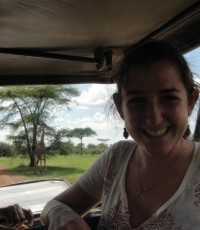
Liza with a giraffe, the pride of Tanzania, in the Serengeti National Park just 3 hours from where she lives.
I’m four months in and feeling quite torn between sinking deeper into the comforts of my work and social life in Mwanza and pushing the limits and taking risks to learn much more about the people, culture, history, and soul of Tanzania and even East Africa. I am happy to say that I have gotten over the hump of getting oriented at work and with my roommates, but I definitely cannot say I know how Tanzania or Mwanza ticks yet. Of course, I can’t even necessarily say this about the United States, but I can definitely predict behaviors better there than here. My goal is to change this in the next few months. It’s definitely going to be challenging, but I know I won’t be satisfied with what I’ve achieved during this fellowship if I don’t. The trouble with getting comfortable is the inclination to settle that comes along with it. I feel myself at the edge of a turning point and am looking forward to setting new goals for exploration and achievement of another level of understanding of my new home.
I work with Baylor International Pediatric AIDS Initiative in Mwanza, Tanzania, and I play with my two Peace Corps volunteer roommates, some other year-long visiting volunteers/fellows/visiting scholars/experts/doctors, a middle-aged Tanzanian woman and her family and animals, a Rastafarian artist, and a Tanzanian first-year medical student. Here are some highlights from my work:
– Realizing Princeton in Africa was right: recent graduates can productively and responsibly contribute to fully operating organizations (yes, I had been skeptical at moments);
– Planning team building and Tanzania-nationalism themed safari for eight Baylor staff members and camping in the Serengeti with these coworkers as they visited their own national park for the first time;
– Organizing, fundraising for, and participating in the 5 km Rock City Marathon with 20 of the clinic’s Teen Club members;
– Hearing adolescents in Teen Club discuss and empathize with each other regarding challenges of ART adherence and laugh at the overlap of their challenges;
– Working with the Mwanza city officials to plan World AIDS Day events;
– Walking side-by-side with our patients and their caregivers during Baylor’s World AIDS Day candle lighting vigil;
– Discussing the challenges of caring for a child with HIV with our patients’ caregivers and setting the foundation for the new caregiver support group;
– Working with other local organizations that specialize in family planning to gain support and training for our existing but un-established reproductive health clinic, which will offer family planning and reproductive health services to our adolescents and patients’ caregivers.
I have been infinitely impressed by Baylor operations and staff. I am so grateful for the opportunity to have a job with this organization. I have felt nothing but supported, inspired, encouraged, and humbled. Here at Baylor, we fill a huge gap in the community by advocating for pediatric HIV patients, which is something no one else is doing.
Notes from the Field
By Stephanie Rapp, 2012-2013 Fellow with Fellow with Generation Rwanda in Rwanda
During the six months I’ve spent in Rwanda so far, I’ve been inspired by a lot. I’m inspired by the organization I work for, Generation Rwanda, which seeks to put vulnerable youth through university in Rwanda’s national institutions. I’m inspired by those same university students, who show up at the leadership workshops and English classes that I teach with hundreds of ideas about the future of their country. I’ve also been inspired by my co-workers, some from Rwanda, some from abroad, who work tirelessly to support the students, and deal regularly with the big questions of NGO work. And I’m inspired by my life in Rwanda itself, which can be challenging and beautiful at the same time.
I try to immerse myself in Rwanda as much as possible, which can be easier said than done. Sometimes living in a big African city means I don’t see much of the average Rwandan’s life, but just getting to work can teach me a lot. Kigali is a sprawling city, and my house is a 40 minute walk from the office. One of the most exciting things I did in my first month in Rwanda was buy a bicycle. Most of the roads in Kigali are well paved, and traffic only gets bad at certain points of the day, but riding my bike to work everyday has still been an adventure. Here’s what the trip looks like.
First, I struggle to get my bike over the threshold of my front gate while children on their way to school stand in awe. We have an amazing market for vegetables, meat and imported Chinese plastics near our house, but I turn the other way, and start off over the bumpy dirt path that dislodges my bike basket from the handle bars.
After a few minutes, I make it out to the main road, where I wait patiently for a gap in the steady onslaught of government regulated motorcycle taxis and painted matatu buses, thumping with club music at 8 AM. Soon, I’m headed downhill to the center of Nyamirambo, my neighborhood, and one of the most bustling, diverse areas in Kigali, though I still don’t quite blend in. Bicycles in Rwanda are usually used to transport heavy loads for long distances, and sometimes as taxis in more rural areas. Needless to say, my purple helmet and pink frame stand out.
I pass a big mosque and several shops selling second-hand dresses, and come over the crest of yet another hill, where to my left I can see the giant, crowded valley neighborhood of Kimisigara below me. After that, it’s only a few minutes left to my office in town, where, after locking up my bike in the stairwell, I start thinking about the work ahead; maybe planning a leadership field trip, or writing up the weekly student newsletter. My bike will be waiting for me at the end of the day, and its uphill most of the way home.
Notes from the Field
By Alison Thurston, 2012-2013 Fellow with Lutheran World Federation in Uganda
Since coming to work at the Lutheran World Federation in Uganda, I’ve been lucky enough to spend much of my time in “the field,” visiting our projects in rural areas and meeting the majority of our staff where they actually live and work. Though I am based out of the head office in Kampala, I get to travel to our five sub-programs throughout the country to interview people for human interest stories, present and co-facilitate trainings, and take photos for our website and annual reports. This week, I am in Sembabule, a town near Masaka, to visit our programs on family planning/reproductive health, HIV prevention and treatment, and child survival.
Monday, I woke up bright and early to catch a ride with staff members into Sembabule town. This was my first time setting my own itinerary, and what I had penciled in as brief hellos and last minute printing at the head office in Kampala spiraled into a long catch-up session between staff members, but by noon we were in Sembabule, at a cheerful and dusty hotel with surprisingly nice projectors. I had spent the last week preparing a presentation on gender sensitivity in implementation and planning, and despite our late start, we quickly segued into a number of exercises for thinking about gender roles in our work and in rural Uganda, and a number of heated debates about challenging existing paradigms ensued.
On Tuesday, I conducted a training I designed for taking better photos in the field. The half-day session was an opportunity to meet some staff members I hadn’t previously introduced myself to, and the participants got really creative, and went out into the health clinic next door where we often work with nurses, to take the kinds of pictures we really would during an outreach.
Wednesday was mostly spent on the (dusty, bumpy) road, going to a sub-county called Lwebitakuli to meet with Christine, a farmer who has been trained to be a healthcare provider, and some of her clients. Christine dispenses birth control pills, shots, and other materials from her storefront in town, and makes house calls throughout the surrounding villages to her clients. She agreed to put on a mock first time visit for me with one of our volunteers, and afterwards, we climbed in the van to interview families she’s worked with for short-term family planning solutions.
Thursday was busy, and I met with midwives throughout the sub-county to talk about their experiences and challenges for the feature I will write for our website (check out www.lwf.or.ug – we just relaunched it this month!). I was tired when we came back into town, so I thought I was hallucinating when, in the parking lot of the health center compound, I saw two… clowns? performers? with three-foot-high papier-mâché heads wandering around the parking lot. They quickly (and awkwardly, because of said heads) clambered onto a flatbed truck with huge speakers blaring reggae to go about their evening…Never a dull moment.
Notes from the Field
By Stephen Tuozzolo, 2012-2013 Fellow with Nyumbani Village in Kenya
When people ask me what I miss most from home, the answer is obvious. I miss clean socks. While it may seem a pedestrian problem, the dirtiness of my socks represents my PiAf experience in microcosm. We examine this sock problem by asking three simple questions. Why do I wear so many socks in the first place? Why are they so dirty? And why can’t they be cleaned?
Why I wear so many socks
I work at Nyumbani Village, a children’s home in Kitui, Kenya. Designed to imitate a rural community, the village is located on a thousand acres of semi-arid land. My duties at Nyumbani are related to rainwater harvesting, water conservation, and other projects that are funded by Johnson & Johnson, which sponsors my fellowship. Because my work is spread across the village, I spend a lot of time walking around. While walking, thorny branches on the ground tend to pierce my flip flops. Also, I fear snakes. For these reasons, I wear shoes and socks.
Why my socks get so dirty
This is a two-pronged problem. First, Kenya is equatorial and Kitui is hot. This harsh environment is not conducive to general sock cleanliness. Second, Nyumbani is located in a semi-arid region of Kenya, meaning that rainfall is scarce and we go months without rain. The land quickly becomes dusty during the dry season, and the dust turns everything red. Especially socks.
Why the socks can’t be cleaned
In Nyumbani, the problem of water scarcity has been the focus of the PiAf Fellow for the past two and a half years. Thanks to Johnson & Johnson-sponsored projects and other infrastructure, water is readily accessible to all residents of the village. However, residents of surrounding communities still travel miles to fetch water and our water supply is not infinite. Sustainable water use is needed to protect this easily accessed but highly exhaustible resource, and I’m working with children in the village to make sure that water is conserved. In short, my socks can’t be cleaned because I practice what I preach: I try to conserve water when I wash my clothes. Since my socks turn the water brown upon contact, I struggle to clean them without using gallons of this precious commodity. My socks also remain dirty because doing laundry by hand takes forever and I’m bad at washing socks.
Clean socks are to be treasured, but first they must be understood. In a world where millions use laundry machines while millions of others walk miles to collect water, we need to be conscious and careful when we use natural resources. We also need to stop wearing so many white socks.








